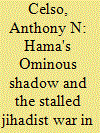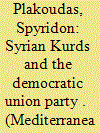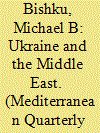|
|
|
Sort Order |
|
|
|
Items / Page
|
|
|
|
|
|
|
| Srl | Item |
| 1 |
ID:
154169


|
|
|
|
|
| Summary/Abstract |
Optimism arose about the discovery of Cypriot and Israeli gas reserves and how they might help resolve the Cyprus question, but the prospective monetization of these reserves has not modified Turkish or Turkish-Cypriot behavior vis-à-vis the Republic of Cyprus, despite Greek-Cypriot hopes. The gas discoveries were not the principal motivation behind the Greek and Greek-Cypriot attempts to establish a trilateral framework of structured cooperation with Israel and Egypt. The export of Cypriot gas to Egyptian liquefied natural gas facilities, however, is the only realistic option available to Nicosia that could also have a positive geopolitical impact on the trilateral framework and help reduce European Union gas dependence on Russia, although the reduction would be quite limited in the short to medium term. The revenues from the monetization of Cypriot gas reserves may be significant for the Cypriot economy, amounting to approximately 2 percent of its gross domestic product, but these direct benefits will materialize gradually over a period of fifteen years and will not be available in time to influence the ongoing talks for the resolution of the Cyprus question.
|
|
|
|
|
|
|
|
|
|
|
|
|
|
|
|
| 2 |
ID:
154171


|
|
|
|
|
| Summary/Abstract |
Little has been written about the Syrian Civil War and its relationship to the 1980s revolutionary period. This essay examines this historical connection and emphasizes the unique features that drive the current rebellion. The essay has five sections. First, it lays out the historical roots of the current confessional-political conflict. Second, it provides an overview of the Muslim Brotherhood – led 1979 – 82 rebellion and its defeat in Hama. Third, it discusses the role that the Muslim Brotherhood revolt plays in the current conflict. Fourth, it analyzes jihadist infighting that has weakened the insurgency. Finally, it assesses the role that Russian, Iranian, and Hezbollah intervention has had in bolstering the regime of Bashar al-Assad. Syria's jihadist revolt has limited but important parallels to the failed 1982 Muslim Brotherhood insurrection. Even with the regime's conquest of Aleppo, the Islamist defeat in today's war is far from certain, although the current jihadist insurgency has stalled.
|
|
|
|
|
|
|
|
|
|
|
|
|
|
|
|
| 3 |
ID:
154173


|
|
|
|
|
| Summary/Abstract |
There is a wealth of literature on the Western perspective of the Crusades. The subject has crossed academic disciplines because of the availability of the literature in the modern world. That does not necessarily mean that what has been said about the Crusades is completely correct. Moreover, little attention is given to the side against which the Crusades were launched in the Middle Ages, and not much has been written on the Muslim responses to the Crusades. The recent past, however, has produced some interesting research on the medieval Muslim perspective and understanding of the Crusades and Crusaders, as seen and recorded by the Muslim scholars of that period. This essay explores and surveys the existing literature on the Muslim responses to the Crusades.
|
|
|
|
|
|
|
|
|
|
|
|
|
|
|
|
| 4 |
ID:
154168


|
|
|
|
|
| Summary/Abstract |
During the 1960s Italy and Greece were undergoing rapid economic and social changes that were significant in both their economic and political ramifications. US policy was able to influence the course of events either bilaterally or multilaterally in the context of the Bretton Woods nexus of institutions and procedures. The central argument of this essay is that Washington's policy was formulated under various contradictory considerations. Cardinal among them was the necessity of preserving the basic requirements of the Bretton Woods regime. The stability of currency parities, particularly the safeguarding of the preeminent position of the dollar as an international reserve currency and its credibility against gold, dictated the continuation of orthodox monetary and fiscal policies. Political stability in Italy and Greece as a prop against political radicalization was a strategic consideration that militated against a strict application of a deflationary policy. The development of transatlantic relations with Charles de Gaulle's France posed a problem from an Allied perspective and was a factor that also militated against the strict application of a policy of monetary stability.
|
|
|
|
|
|
|
|
|
|
|
|
|
|
|
|
| 5 |
ID:
154172


|
|
|
|
|
| Summary/Abstract |
By June 2016, the Kurds of Syria (just 12 percent of the country's total population) controlled almost all of the 822-kilometer Turkish-Syrian border and advanced against Manbij and Raqqa — the Islamic State's resupply center and capital, respectively. How did the Syrian Kurds grow from pariahs to kingmakers in northern Syria? This essay surveys the strategy of the Democratic Union Party (PYD), the most powerful organization among the Syrian Kurds, from 2011 until the first half of 2016, and shows how the PYD's realpolitik secured the party's survival and, eventually, success in the midst of a vicious sectarian civil war.
|
|
|
|
|
|
|
|
|
|
|
|
|
|
|
|
| 6 |
ID:
154170


|
|
|
|
|
| Summary/Abstract |
Ukraine is a country with close ethnic and historical ties to Russia, although it seeks to limit the political and economic influence of its more powerful neighbor. Therefore, since independence Ukraine has attempted to diversify its international relations as much as possible and to seek support for its territorial integrity. In the long run, it regards its political and economic futures as connected with the West. Meanwhile, the Middle East offers an alternative to mitigate pressure from Russia and to develop mutually beneficial relations with Turkey and Israel, with whom there are strong historical and cultural connections that offer some promise.
|
|
|
|
|
|
|
|
|
|
|
|
|
|
|
|
|
|
|
|
|